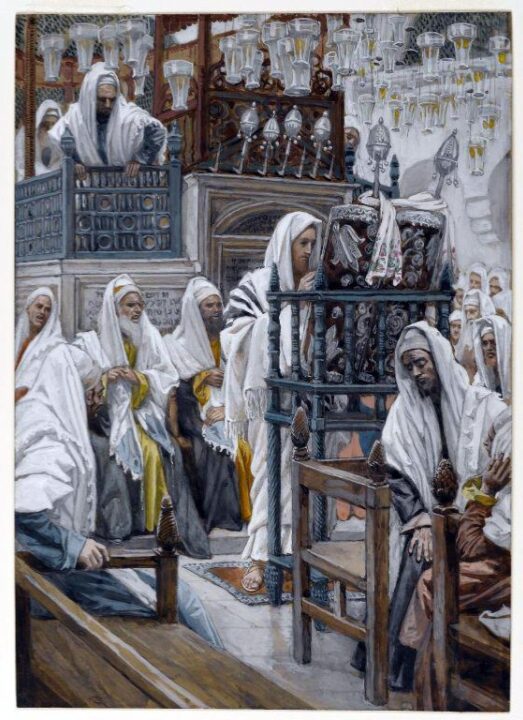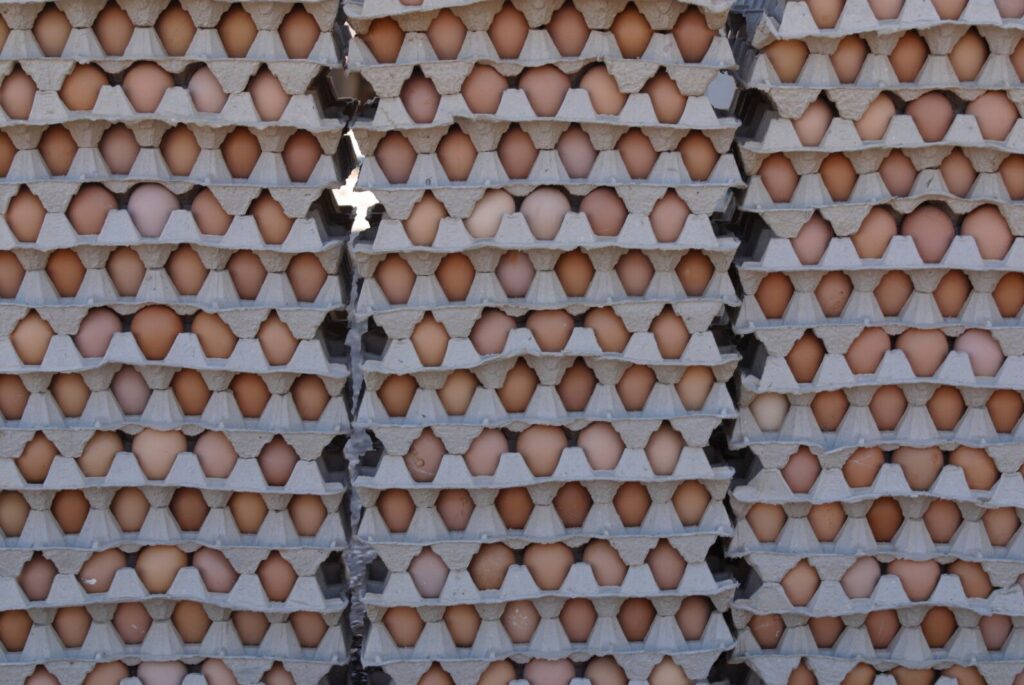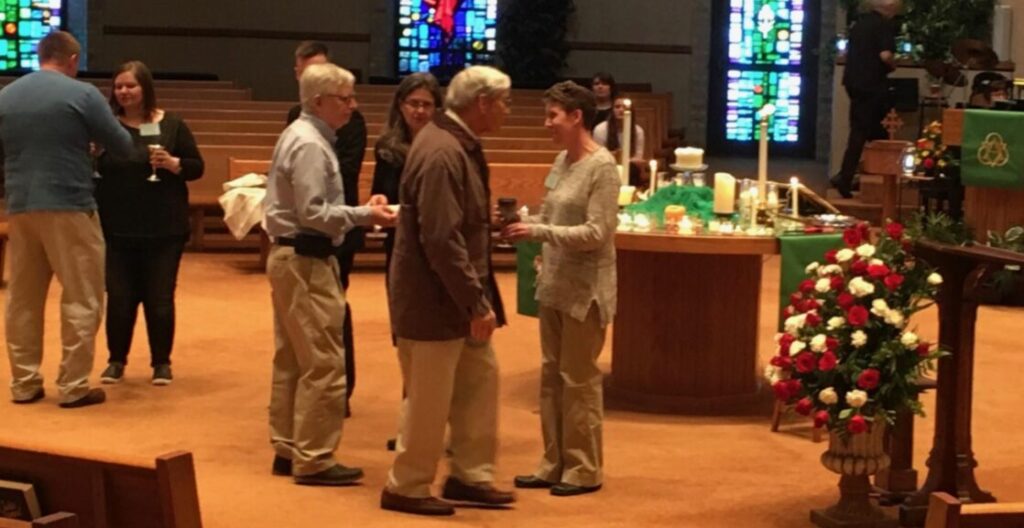Not What We Want to Hear
What brought you to church today?
And I don’t mean your car or your spouse. You had a lot of other choices this morning and maybe going out for breakfast sounded better. But you came here instead. I want you to think about why you came. Why did you make this choice? I’m asking you because that’s where I get into a bit of it in the scripture.
This scripture, Luke 4:21-30, is the rest of the story from last week. If you were here last week, you know Jesus has come back to his hometown of Nazareth, he’s gone into the temple, and they handed him a scroll.

He read from Isaiah. He essentially announced his ministry is going to be about bringing good news to the poor, release to the captives, recovery of sight to the blind, and freedom for the oppressed. This has been fulfilled in your hearing. Last week I argued that that’s what they were supposed to be doing anyway.
Not everybody in that picture is happy. Jesus is the one reading the scrolls, but the other people are not necessarily happy about what he’s saying. But they are amazed that he had the gall, that might be the church’s word for it, to say that he’s going to fulfill all of this.
But he didn’t stop there. They’re excited and they know this guy, Jesus grew up here. This is Joseph’s son. So, they have some expectations of him that play into this. But then what happens is he tells them this story.
He gives them an example of two healings that took place. The widow of Zarephath and Naaman. Now, for those of you who don’t recognize those stories, let me give you the backstory.
The Widow of Zarephath was someone that Elijah came across, she and her son were starving, there had been no water, they were at the last of their oil and flour, and she was about to make the last loaf of bread so they could eat. When Elijah shows up and says, Make that big enough so I can have some. And he says, don’t worry about the rest. She does it. She trusts. And indeed, they never run out of food until it rains again.
Naaman is a Syrian commander who had conquered Israel as part of the spoil, he took an Israeli girl as a prisoner to work in his house. He had sores on his body and she says, if you go and talk to the Jewish prophet, he will tell you how to get rid of that. He listens to the girl and he does what the prophet tells him.
So it sounds like two good stories, right? Here’s where I sat with my wonderment and I invite you into my wonderment. Why did they go from, “wow, this guy’s something”, to the rage where they wanted to drive him off the cliff? After he tells those stories, they drive him out to the cliff. Just think about that. I sat with that question. I thought, well, he had to of pushed their buttons. So, what buttons did he push?
I think we can tell in what he said, he talked about healing to others, to people who weren’t part of the Jewish faith. That’s part of it, but I don’t know that that would put them into a rage. He had to have said something that hurt them personally, and you can get a mob to rage easier than an individual because they get that mob energy. But where I landed on this is wondering if he didn’t.
The way they understood what he said if it didn’t tell them the healing they were seeking, the reason they showed up at the synagogue. He didn’t come for them. He came to take care of others. This is where my mama bear could get mad enough to drive someone off a cliff. If I was there seeking healing for my daughter and you told me that my daughter doesn’t count, that would drive me. Then I will find rage.
That’s why I called this sermon “Not What We Want to Hear”, because we think we’re doing it right.
We think we’re doing all this stuff the way we’re supposed to, and I have empathy for those who were in the synagogue. I mean, there were certainly some Jewish leaders there or religious leaders there, but there were also probably others who were coming and looking for something from God of which it could have been healing. I’m going to come with my wounds, my baggage, my hurts, and my cares. I want God to do something with my stuff. But, Jesus just said, my stuff isn’t it. He’s going to take care of other people. Wow.
Can you feel that? I don’t say that because I think Jesus doesn’t care about us. Because I think Jesus does. I think God cares about all of that. I think Jesus was trying to get their attention because they were only focused on their needs and what they wanted.
Jesus is saying, you need to look around. You need to see the hurt and the pain in other people.
Right now, the price of eggs is in the news. I went to Stouffer’s and I don’t usually buy my eggs at Stouffer’s, but I checked the price of eggs.

Well, that made my jaw drop. Then, I went to buy them at the central market. I saved money by going to the market. Because Levi looked at me and said, “I don’t care what the market does. The price of grain didn’t go up. The price of chickens didn’t go up. My price of eggs doesn’t go up.”
How many people do we recognize or see among us who are trying to decide if they’re going to pay their rent or get their medication? How many people at the grocery store do we see who are not even going to the egg aisle? They’re buying mac and cheese because you can live on that. Been there, done that. You can live on cans of beans. It’s not the most nutritious diet, but you can afford it if you don’t have much to spend.
How do we see those people? Do we acknowledge those people? Because there’s something that I’ve learned in ministry. It’s that when we stop worrying about ourselves and start thinking about how we’re doing things for others, we can be healed in the process. Our stuff gets healed. We find healing that we may not even know we need in the process of caring for others.

This is a communion picture. It’s about that invitation to say, I see your pain and there are choices. There are options. There’s hope. There’s hope in our faith. There’s hope because every person that comes to this table gets a piece of bread and a cup of juice. You don’t have to pay. We don’t have indulgences anymore. We got rid of them. You don’t have to prove your worthiness to come forward. You just come forward and you will receive the bread and the cup that we believe brings about forgiveness and wholeness and a personal relationship with Jesus Christ.
That’s what we can offer and we can choose to be people who listen to each other.
Sometimes that makes a world of difference. If someone just gets heard, if we are willing to listen to somebody else’s pain, that’s the point of the Compassion Team, they’re there to listen to our pain, anything you want to share, anything that you need to talk to somebody else about, they’re there to listen.
Hopefully, we can ask some good questions because I’ve also learned that it’s not about telling people how to get better. We all have to find the answers within us. So it’s about asking good questions. We can do that. We can be people of empathy and compassion for others. We can be people who want to make a difference in the environment. We can be people who want to make a difference with people who feel victimized right now, LGBTQ+, people of color, and immigrants. We can be a source of safety, and of peace. Of maybe even love and acceptance that they haven’t found anywhere else.
So the question is, who will we be?
How will we respond to Jesus’ call to say, it’s not about our healing, it’s about the healing of others? We’ll receive healing in the process. I do believe that. But it’s not about doing it for us. It’s about doing it because other people need us. Other people need to know the love and compassion we have found, the forgiveness we have found, and the grace. It is about mercy.
So, is that who we’re willing to be? Are we willing to reach out to our siblings and undo the knots of fear? Are we willing to liberate the vulnerable from the prisons of poverty? Are we willing to offer comfort to those who are fearful? Are we willing to step out of the box that we have created as Church of the Apostles because that’s the way we’ve always done it? Are we willing to let those sides down and explore other ways of being?